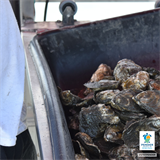
Oysters offer:
Ecological Benefits: Oysters are ecosystem engineers. They filter large amounts of water, improving water quality by removing excess nutrients and sediment. This filtration process helps maintain a healthy balance in marine environments and supports the growth of seagrasses and other marine life by reducing turbidity and promoting light penetration.
Habitat Creation: Oyster reefs provide essential habitat for a variety of marine species. They create complex three-dimensional structures that serve as shelter, spawning grounds, and feeding areas for fish, crabs, shrimp, and other invertebrates. These reefs also protect coastlines from erosion by breaking waves and stabilizing sediments.
Biodiversity Support: Oyster reefs support high levels of biodiversity. They are home to a diverse array of species, including commercially important fish like red drum and speckled trout, as well as endangered species such as the Eastern oyster toadfish.
Economic Importance: Oysters have significant economic value. They support commercial fisheries and aquaculture industries, providing jobs and income for coastal communities. Oyster farming, in particular, has grown in popularity as a sustainable seafood option, meeting consumer demand while reducing pressure on wild oyster populations.
Cultural and Culinary Significance: Oysters have cultural significance in many coastal communities worldwide. They are a part of traditional cuisines and culinary heritage, enjoyed raw on the half shell, cooked in various dishes, or used in sauces and soups. Oyster festivals and events celebrate these culinary traditions and promote local seafood industries.
Climate Resilience: Oyster reefs can contribute to climate resilience. They can absorb wave energy and reduce the impacts of storms and flooding, providing natural coastal protection. Restoring and protecting oyster habitats can be part of coastal resilience strategies in the face of climate change and sea-level rise.
Oysters are not only important for their ecological functions but also for their economic, cultural, and climate-related contributions, making their conservation and sustainable management crucial for the health of coastal ecosystems and human well-being.



